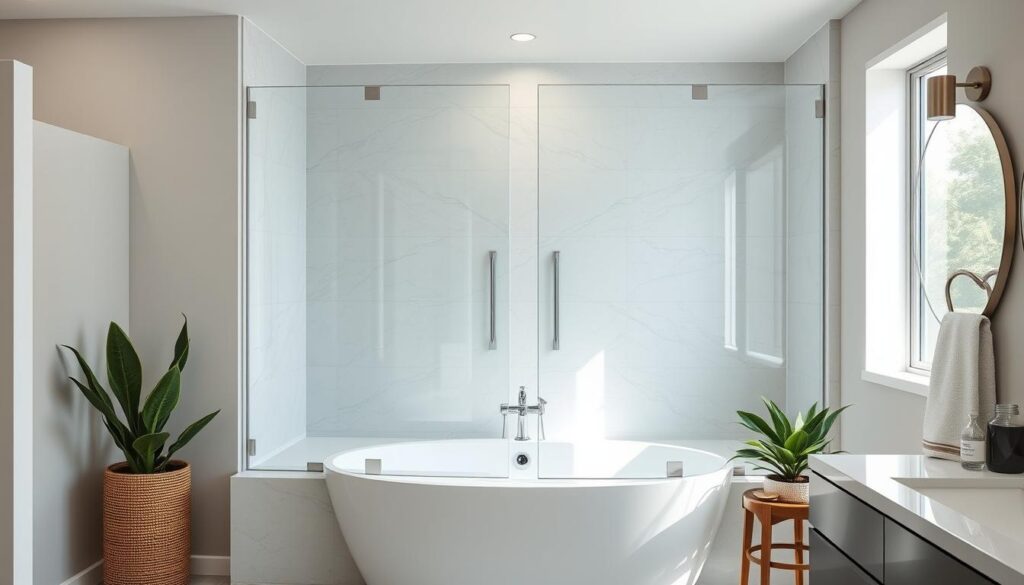
Shower doors for tubs can revolutionize your bathroom’s look and function. They’re not just stylish; they make your space more practical too. The right choice can turn your daily shower into a luxurious experience.
Picking a shower door isn’t just about looks. It’s about improving your bathroom’s usefulness. Options range from space-saving sliding doors to elegant frameless designs.
The perfect door can even increase your home’s value. It’s an investment that pays off in style and convenience.
Let’s explore what you need to know about shower doors. We’ll cover types, measurements, and installation tips. This guide will help you choose the ideal door for your tub.
While updating your bathroom, consider adding a stylish bench. It could perfectly complement your new shower door.
Key Takeaways
- Shower doors enhance both aesthetics and functionality
- Various types suit different bathroom layouts and preferences
- Proper measurements are crucial for a perfect fit
- Material choice affects durability and maintenance
- Professional installation is recommended for best results
- Shower doors can increase your home’s value
Understanding Different Types of Shower Doors for Tubs
The right shower door can transform your bathroom. Let’s explore various tub door options, each with unique benefits and style.
Sliding Door Systems
Sliding shower doors are great for smaller bathrooms. They glide on a track, saving floor space. These doors typically fit standard tub openings, ranging from 22 to 36 inches wide.
Larger spaces might need extra panels for full coverage.
Hinged Door Options
Hinged bathtub doors offer a classic look and easy access. They swing outward, needing more clearance but providing wider entry. Most hinged doors are 57 to 62 inches tall, ideal for tub-shower combos.
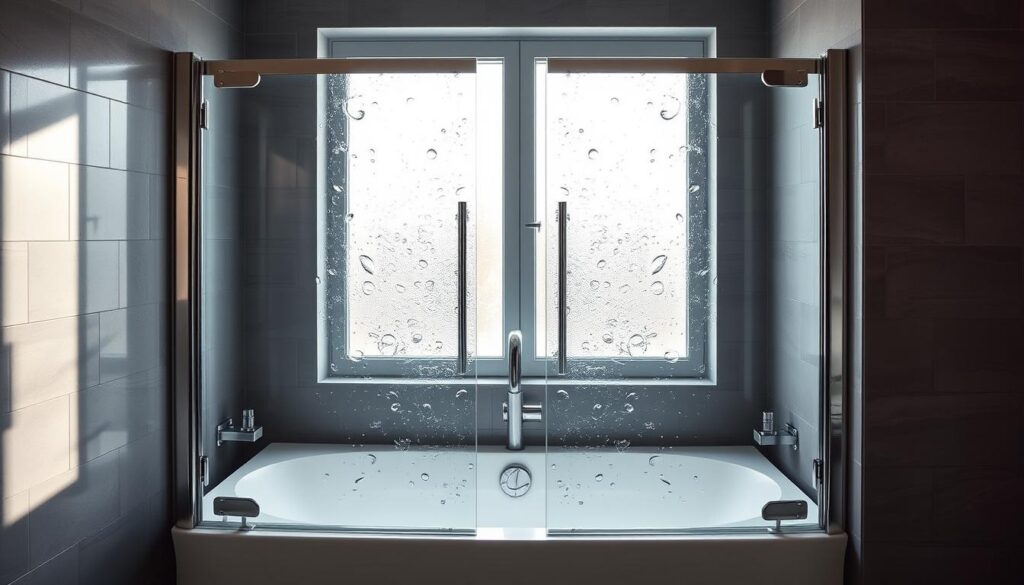
Frameless Glass Designs
Frameless glass shower doors create a sleek, modern look. They use thicker glass and minimal hardware. This style makes bathrooms feel more spacious and bright.
Custom built-in features can beautifully complement these doors.
Consider privacy needs, maintenance, and budget when choosing a shower door. Clear glass offers openness, while frosted options provide privacy. Prices vary based on material, size, and installation.
Measuring Your Space: Essential Pre-Purchase Guidelines
Accurate shower door measurements are vital before buying. Start by measuring your tub enclosure sizing. For alcove tubs, measure wall-to-wall width at the top and bottom.
Choose the larger measurement and round up to the nearest 1/8 inch. Most alcove tubs are 60 inches wide. Sliding doors around 58 inches typically fit well.
For height, measure from the tub’s edge to the ceiling on both sides. Use the larger measurement, rounding up to 1/8 inch. Standard shower doors are about 72 inches tall.
Check for fixtures or windows that might interfere with door placement. The minimum shower door width allowed by code is 22 inches.
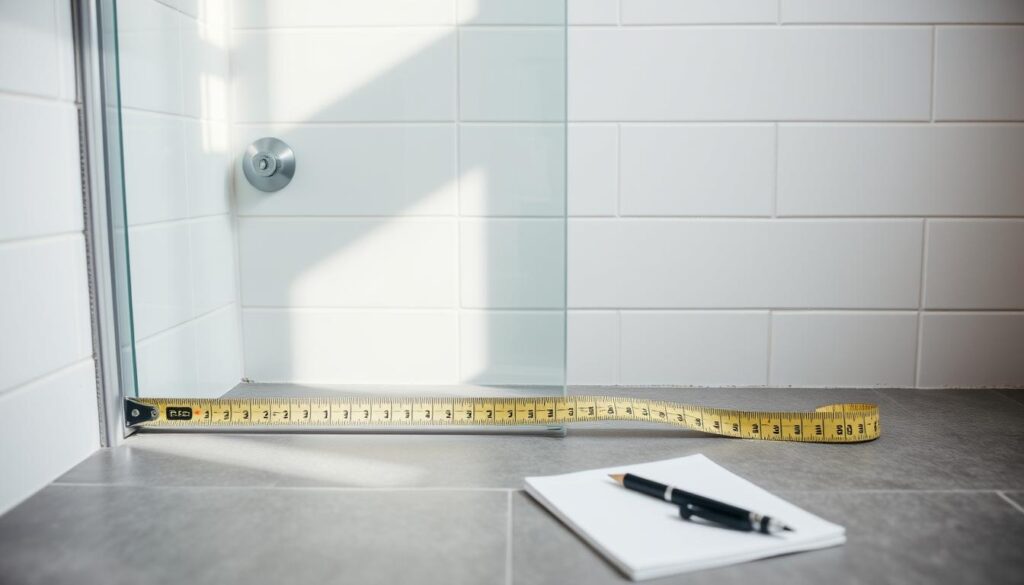
- Pivot doors usually span 48 inches with a 26.5-inch opening
- Sliding doors often cover 60 inches with 22-25 inch openings
- Frameless doors typically range from 56 5/8 to 59 5/8 inches
For freestanding tubs, measure the outer dimensions to ensure proper fit. Taking time for precise measurements will save you installation headaches. Your new shower door will beautifully transform your space.
Material Choices and Durability Factors
The right shower door materials can enhance looks and longevity. Let’s explore options that balance style, function, and durability.
Tempered Glass Options
Tempered glass shower doors offer safety and strength. They come in various thicknesses and styles. Choose clear glass for a modern look or frosted glass for privacy.
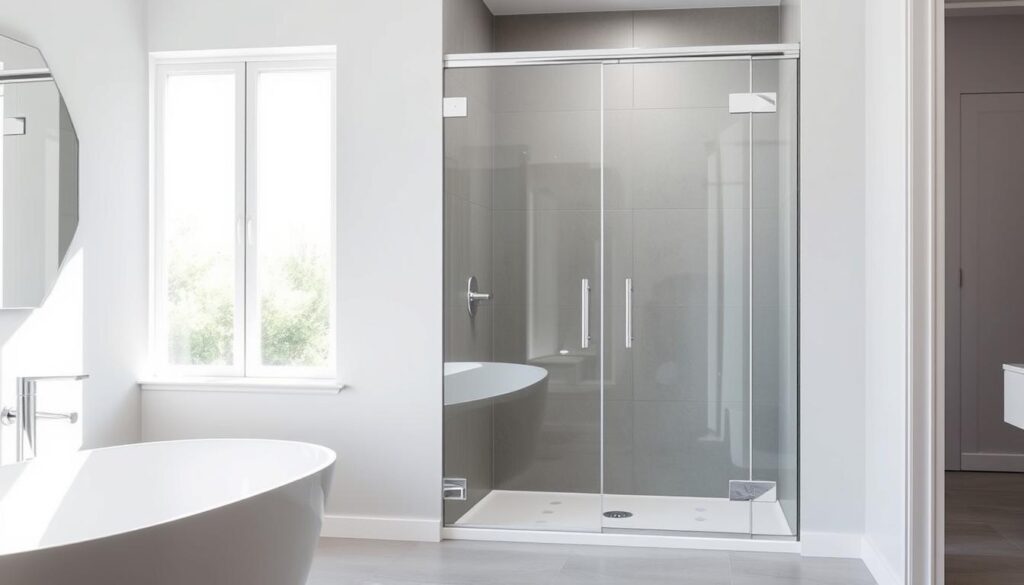
Frame Materials and Finishes
Shower door frames offer various material options. Aluminum is lightweight and rust-resistant. Stainless steel provides durability and a sleek appearance.
Brass adds a classic touch. Choose finishes like chrome, brushed nickel, or oil-rubbed bronze to match your style.
Seal and Hardware Quality
Good door seals keep water inside the shower. Quality hardware ensures smooth opening and closing. Look for sturdy hinges and comfortable handles.
These small details greatly impact your shower door’s daily performance.
Consider style and budget when selecting materials. Glass thickness ranges from 3/8 inch to 1/2 inch for frameless doors.
Thicker glass costs more but offers better durability. Durability is key, similar to roofing choices. A well-made shower door is a valuable bathroom investment.
Style and Design Considerations
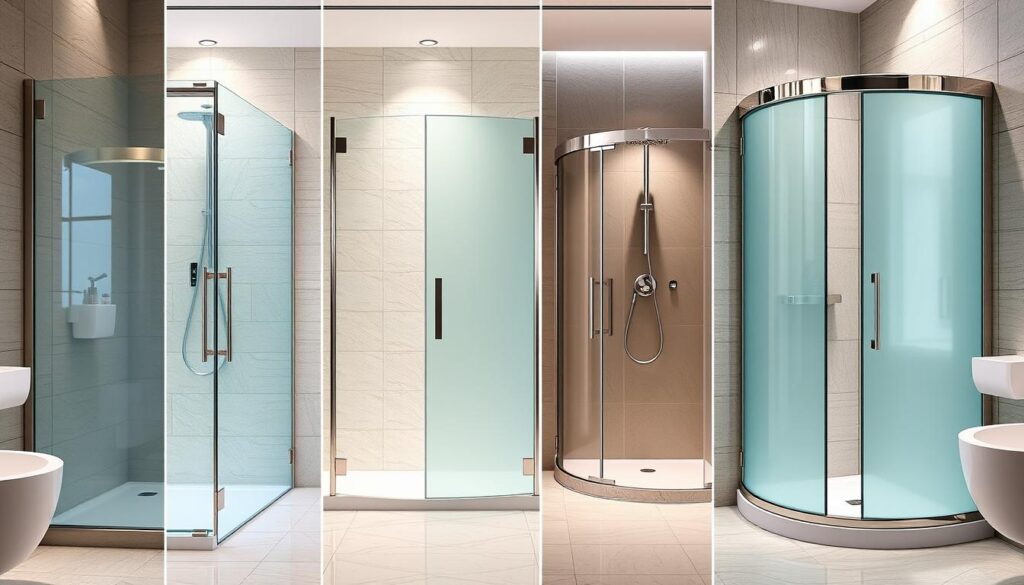
Style and design are key when picking a shower door for your tub. Your choice should match your bathroom’s look and meet your needs. Let’s look at some popular shower door designs.
Frameless designs are hot right now for tub and shower doors. They give a sleek, modern look that fits many bathroom styles. Sliding barn doors add a rustic charm to your space.
Hinged doors offer a classic look for those who prefer tradition. When choosing your shower door design, think about your bathroom’s size and your needs.
- Bathroom size: Sliding doors work best in smaller spaces
- Accessibility: Sliding options may be easier for those with mobility issues
- Maintenance: Hinged doors have more moving parts to maintain
- Budget: Sliding doors often cost less than hinged designs
Glass type is also key for tub enclosures. Clear glass makes spaces feel open. Frosted or textured glass adds privacy and visual appeal.
For a unique touch, try modern bathroom tiles that match your shower door. Your door should look great and work well in your space.
Take good measurements and ask a pro for help. This ensures the perfect fit for your new bathroom look.
Installation Requirements and Process
Changing your tub with a new shower door can be thrilling. Understanding the process is vital for success. Let’s explore what it takes to create your dream bathroom.
DIY vs Professional Installation
DIY tub door setups can save money but need careful planning. Professional installation ensures precision but costs more. Your choice depends on your skills and the door’s complexity.
Tools and Materials Needed
For a successful shower door installation, you’ll need:
- Measuring tape and level
- Drill and screwdriver
- Silicone caulk and caulking gun
- Safety glasses and gloves
- Shower door kit with all hardware
Common Installation Challenges
Be ready for these possible issues during installation:
- Ensuring proper alignment of tracks and doors
- Dealing with uneven walls or surfaces
- Correctly sealing edges to prevent leaks
- Working with different wall materials (tile, drywall)
Accurate measurements are key for a smooth DIY tub door setup. Always double-check your measurements before starting. Take your time during installation for the best results.
Maintenance and Cleaning Best Practices
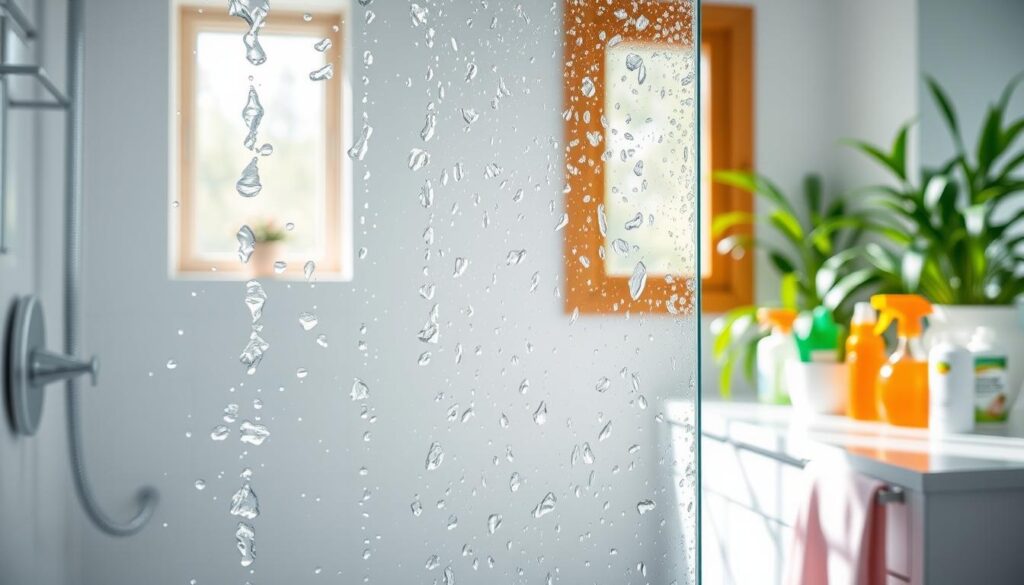
Keeping shower doors spotless can be easy with the right approach. Let’s explore some practical tips for maintaining a pristine bathroom effortlessly. These methods will help you keep your shower looking its best.
Start by adding daily habits to your routine. Use a squeegee after each shower to wipe down the glass. This prevents water spots and mineral buildup, making weekly cleaning easier.
For a deeper clean, mix equal parts white vinegar and water in a spray bottle. This natural solution tackles soap scum without harsh chemicals. It’s perfect for regular maintenance.
Here’s a quick cleaning routine to follow:
- Spray the vinegar solution on the glass
- Let it sit for a few minutes
- Wipe with a microfiber cloth
- Rinse with warm water
- Dry with a clean towel or squeegee
For tough stains, make a paste with baking soda and water. Gently scrub the area with a soft-bristled brush, then rinse well. Regular maintenance prevents long-term damage to your shower doors.
For hard water stains, use a cleaner made for glass shower doors. Always test on a small area first. Clean metal frames with mild soap and water. Avoid abrasive cleaners that can damage finishes.
Following these tips will keep your shower spotless for years. A little effort goes a long way in preserving your bathroom’s beauty. For more ideas, check out these alternative flooring options to transform your space.
Cost Analysis: Budget to Luxury Options
Shower door prices vary widely, catering to different budgets and preferences. Your choice impacts your bathroom’s look and functionality. Let’s explore options from budget tub enclosures to luxury bathtub doors.
Entry-Level Door Options
Budget tub enclosures start around $200. These include basic sliding doors or simple pivot designs. They offer essential functionality and can improve your bathroom’s appearance.
Entry-level options often feature clear glass and standard finishes. They’re perfect for those on a tight budget.
Mid-Range Selections
Mid-range shower door prices fall between $400 and $800. These options offer better quality materials and more design choices. You’ll find frameless sliding doors, semi-frameless pivot doors, and some custom-sized options.
Mid-range selections often include easy-clean glass coatings. They also come in a wider variety of finishes.
Premium Door Features
Luxury bathtub doors start at $1000 and can go much higher. These high-end options boast premium features like specialized glass treatments. They also offer custom sizing and designer hardware.
You might find doors with unique opening mechanisms or ultra-clear glass. Some even have smart glass technology that switches from clear to opaque. Professional bathroom remodelers in Fairfax County often recommend these for upscale renovations.
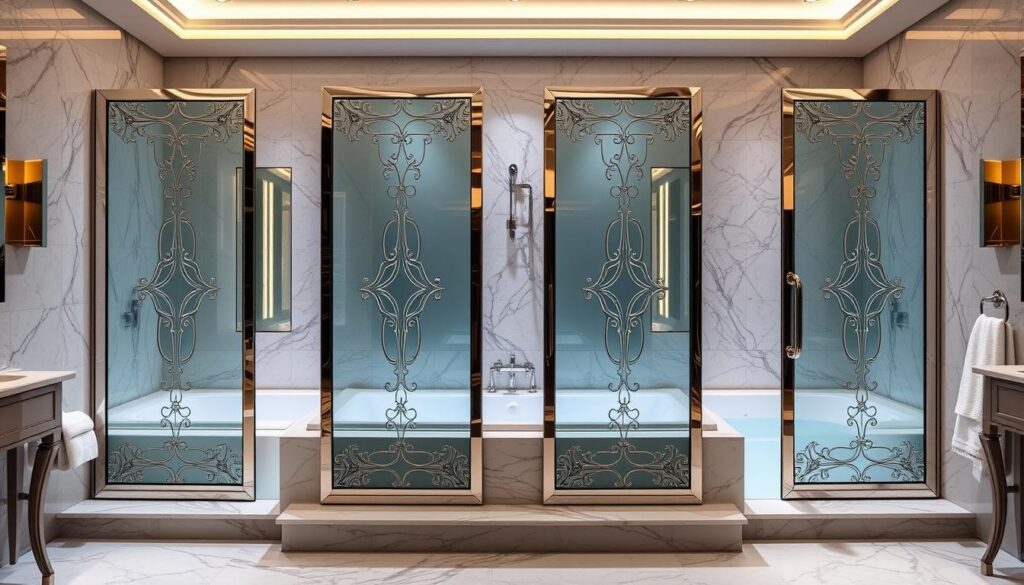
Remember, installation costs can add to your total investment. DIY is possible for some entry-level doors. However, professional installation is often recommended for mid-range and luxury options.
Factor in these costs when planning your bathroom upgrade. This ensures you stay within budget while achieving your desired look.
Safety Features and Standards
Shower door safety is vital for protecting you and your family. Tempered glass is four to five times stronger than regular glass. If broken, it shatters into small, blunt pieces, lowering injury risks.
Look for doors meeting ANSI Z97.1 safety standards. These have passed tough testing. Consumer Product Safety Commission rules guide architectural glazing materials.
Shower glass must show maker details and safety glass type. Thicker glass offers more stability and durability. Regular inspections help spot potential issues early.
For extra safety, choose doors with smooth edges and sturdy handles. Anti-slip coatings add protection. Sliding doors should have locks to prevent unexpected openings.
Frameless designs need professional installation for maximum security. Keep your shower doors clean and well-maintained. This prevents accidents and ensures a safe bathing experience.



